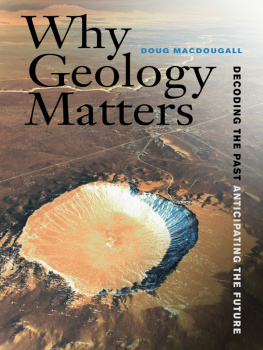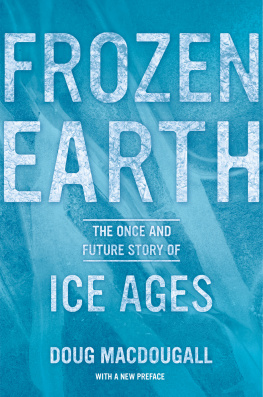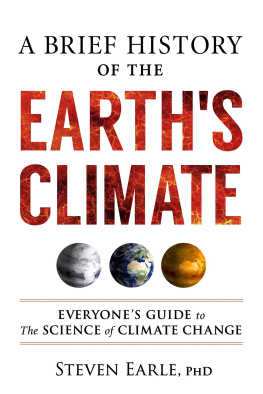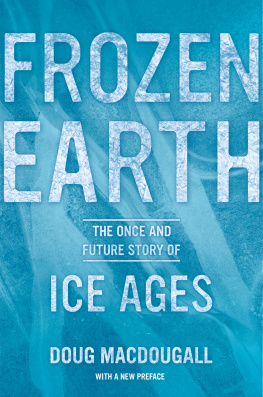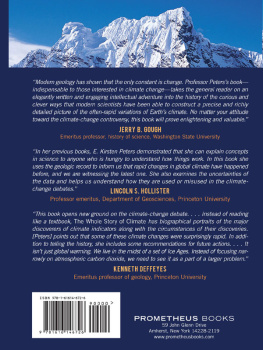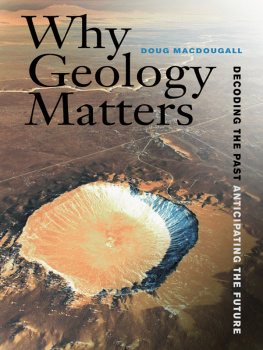University of California Press, one of the most distinguished university presses in the United States, enriches lives around the world by advancing scholarship in the humanities, social sciences, and natural sciences. Its activities are supported by the UC Press Foundation and by philanthropic contributions from individuals and institutions. For more information, visit www.ucpress.edu.
University of California Press, Ltd.
Macdougall, J. D., 1944
the future / Doug Macdougall. 1
p. cm.
Includes bibliographical references and index.
1. Historical geology. I. Title.
QE 28.3. M 334 2011
This book is printed on Cascades Enviro 100, a 100% post consumer waste, recycled, de-inked fiber. FSC recycled certified and processed chlorine free. It is acid free, Ecologo certified, and manufactured by BioGas energy.
PREFACE
The earth is not a mere fragment of dead history, stratum upon stratum like the leaves of a book, to be studied by geologists and antiquaries chiefly, but living poetry like the leaves of a tree, which precede flowers and fruitnot a fossil earth, but a living earth.
Henry David Thoreau, Walden
In this excerpt from Walden, Thoreau inadvertently touched on something geologists and other scientists who study the Earth have appreciated for a long time but that has become increasingly important for understanding our planet in recent years: the Earth, far from being static, is dynamic and ever changing. Not a living Earth, exactly, but an Earth with different parts that continually interact in ways that have produced monumental changes over its long history. One way to read that history is through Thoreau's strata, like the leaves of a book; there are other ways, too, as will become apparent in the chapters that follow.
History repeats itself is an adage usually invoked to remind us that by studying history we may be able to avoid mistakes of the past. That may even be true, at least some of the time. Yet there are thoselike Nassim Taleb, author of The Black Swanwho argue just the opposite, that history is not a good guide to the future and that the world is shaped by events that are rare or unprecedented and therefore largely unpredictable. Still, even proponents of this point of view don't advocate that we all become fatalists, just that we learn to expect the unexpected. But if that is so, should we study history at all?
For the Earth, that is an easy question to answer, because only by understanding our planet's past can we anticipate its future. It is true that Nature can confront us with the unexpected: a freak storm, a devastating earthquake or tsunami, an asteroid impact. But these are only unexpected because they are rare in human experience. They are all things that have happened repeatedly during the Earth's history, and they obey the natural laws of physics and chemistry. That is why decoding the Earth's past is so important: the same physical and chemical principles that have governed our planet since its formation will also apply in the future. History really will repeat itselfif not in precise detail, then at least in general terms. Geology students are often taught that the present is the key to the past. But earth scientists also recognize that in many ways the past is the key to the future.
The span of the Earth's history is immense: 4.5 billion years. It is hard to comprehend such a vast stretch of time, but with so much time available, even geological processes that operate at a snail's pacelike erosion of a mountain or movement of a tectonic platewill eventually accomplish equally vast changes to our planet. It will take millions of years, but the Alps will be worn down to a flat plain, and Los Angeles will one day slide past San Francisco, heading north along the San Andreas Fault.
Such forecasts are interesting to contemplate, but they obviously don't have an immediate impact. No one reading this, or even their great-grandchildren, will witness these things. We are far more likely to experience the effects of some of the geoscience-related issues we hear about almost daily: floods, hurricanes, volcanic eruptions, earthquakes, deforestation, endangered species, mineral shortagesthe list goes on, and I haven't even mentioned the big one, climate change. The problem is, most people without a background in the geosciences don't have a clear understanding of how Earth processes that affect our daily lives and our futures work, and this is true even for many of those who must manage society's response to these kinds of issues. Unfortunately, earth science subjects are usually given short shrift in the educational system. Recent data from the American Geological Institute, for example, show that in Texasa state where the geosciences play an important role in the economyonly 2 percent of ninth-grade students are enrolled in earth science courses. For biology, the figure is 95 percent. My hope is that this book will, in some small way, stimulate a deeper interest in the field among its readers, and perhaps help to improve this situation.
Because knowledge of the Earth's past is such an important part of understanding how our planet works today and will in the future, this book, in addition to dealing with specific topics such as earthquakes and asteroid impacts, examines in a chronological way some of the important events that have affected the Earth over the past 4.5 billion years. Chapters exploring the Earth's history are interspersed with chapters devoted to specific events and processes; I hope that this structure, while a bit unconventional, proves both interesting and stimulating. As much as possible, I have tried to avoid getting bogged down in complex scientific discussions while still adhering to the main messages of the underlying research.
The twenty-first century is an exciting time to be a geoscientist. The stereotypical geologist trudging up a mountain with a pick still existsand plays an important on-the-ground role. But the pick is now supplemented with an array of tools that make it possible to study the Earth and the solar system in unprecedented detail: satellites, supercomputers, electron microscopes, mass spectrometers, wireless communication, submersibles, and spacecraft, to name just a few. A geoscientist, Harrison Schmitt, was among the Apollo astronauts who visited the Moon (and brought back rock samples). Geoscientists regularly descend miles under the sea in research submersibles, don protective clothing to sample the gases escaping from active volcanoes, send off autonomous drifters and gliders to roam the oceans collecting data, or brave the rigors of the Antarctic to collect ice cores holding records of past climates. Some work in clean labs with samples so small that a single dust particle or fingerprint can contaminate an analysis; others feed their collected data into supercomputers to produce three-dimensional visualizations of parts of the Earth. Many of these scientists would not automatically think of themselves as geologiststheir training is as likely to be in mathematics or oceanography as geology. But they are all part of an interdisciplinary effort to understand our planet's past, present, and future. It is in that sense that the word

